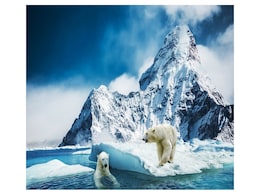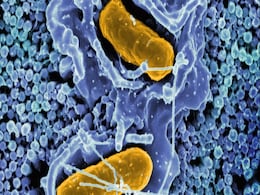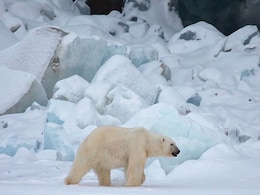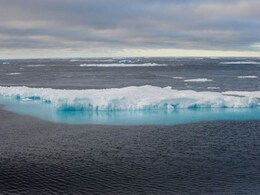Humans In Arctic
- All
- News
- Videos
-

SpaceX’s Fram2 Crew Captures First-Ever Views of Earth’s Polar Regions
- Thursday April 3, 2025
- Written by Gadgets 360 Staff
SpaceX’s Fram2 mission, launched on March 31, has made history as the first astronaut mission to orbit over both poles. The Crew Dragon spacecraft Resilience is carrying four first-time astronauts—Chun Wang, Jannicke Mikkelsen, Rabea Rogge, and Eric Phillips—on a research-driven journey. The crew has captured stunning images of Earth’s Arct...
-
 www.gadgets360.com
www.gadgets360.com
-

Polar Bears in Alaska Face Rising Pathogen Threats Due to Climate Change
- Tuesday December 3, 2024
- Written by Gadgets 360 Staff
Polar bears in the Chukchi Sea are increasingly exposed to pathogens like Toxoplasma gondii, brucellosis, and canine distemper due to warming climates. Researchers revealed a significant rise in pathogen antibodies in polar bears since the 1990s, linking this trend to reduced sea ice, altered diets, and human interaction. The findings raise concern...
-
 www.gadgets360.com
www.gadgets360.com
-

Human Immune System Might Have Evolved From the Ancient Microbe ‘Asgard’, Claims Study
- Wednesday September 4, 2024
- Written by Gadgets 360 Staff
The immune system found in humans and all other complex life forms might have evolved from an ancient species of microbes known as Asgard archaea, as per new research. These microbes, which are believed to have emerged around 2 billion years ago, have provided insight into the origins of vital proteins that help organisms fend off viruses.
-
 www.gadgets360.com
www.gadgets360.com
-

Climate Experts Warn "Ice-Free Arctic Summers Before 2050"
- Thursday January 19, 2023
- World News | Press Trust of India
In a stern warning, two climate experts on Wednesday cited scientific studies to assert that human activity is pushing Earth to the brink of a dangerous climate tipping point and immediate action is needed to safeguard humanity's future and protect o
-
 www.ndtv.com
www.ndtv.com
-

Here's Why 2 Degrees Celsius Global Warming Cap Won't Save Arctic Sea Ice
- Tuesday April 3, 2018
- World News | Agence France-Presse
Even if humanity stops global warming in its tracks at two degrees Celsius, long seen as the guardrail for a climate-safe world, Arctic sea ice will still disappear in some years, scientists have warned.
-
 www.ndtv.com
www.ndtv.com
-

Norway Fines Tourist Guide For Scaring Polar Bear
- Friday August 25, 2017
- Offbeat | Agence France-Presse
Usually the humans are scared of the wild animals. But in the Norwegian far-north, an Arctic tourist guide has been fined 1,300 euros ($1,500) for scaring off a polar bear.
-
 www.ndtv.com
www.ndtv.com
-

Humans Have Filled The Pristine Arctic Ocean With 300 Billion Pieces Of Floating Plastic
- Thursday April 20, 2017
- World News | Chris Mooney, The Washington Post
Drifts of floating plastic that humans have dumped into the world's oceans are flowing into the pristine waters of the Arctic as a result of a powerful system of currents that deposits waste in the icy seas east of Greenland and north of Scandinavia.
-
 www.ndtv.com
www.ndtv.com
-

Nose-To-Nose With A Polar Bear? In Alaska, That's Just A Normal Day.
- Wednesday November 30, 2016
- World News | Rachel Walker, The Washington Post
In and around Kaktovik, polar bears wait - among human neighbors - for sea ice.
-
 www.ndtv.com
www.ndtv.com
-

Humans Inhabited Arctic 10,000 Years Earlier Than Thought: Study
- Friday January 15, 2016
- World News | Agence France-Presse
The remains of a prehistoric mammoth bearing evidence of having been attacked by arrows or spears suggests humans lived in the Arctic thousands of years earlier than believed, according to a study published Thursday.
-
 www.ndtv.com
www.ndtv.com
-

SpaceX’s Fram2 Crew Captures First-Ever Views of Earth’s Polar Regions
- Thursday April 3, 2025
- Written by Gadgets 360 Staff
SpaceX’s Fram2 mission, launched on March 31, has made history as the first astronaut mission to orbit over both poles. The Crew Dragon spacecraft Resilience is carrying four first-time astronauts—Chun Wang, Jannicke Mikkelsen, Rabea Rogge, and Eric Phillips—on a research-driven journey. The crew has captured stunning images of Earth’s Arct...
-
 www.gadgets360.com
www.gadgets360.com
-

Polar Bears in Alaska Face Rising Pathogen Threats Due to Climate Change
- Tuesday December 3, 2024
- Written by Gadgets 360 Staff
Polar bears in the Chukchi Sea are increasingly exposed to pathogens like Toxoplasma gondii, brucellosis, and canine distemper due to warming climates. Researchers revealed a significant rise in pathogen antibodies in polar bears since the 1990s, linking this trend to reduced sea ice, altered diets, and human interaction. The findings raise concern...
-
 www.gadgets360.com
www.gadgets360.com
-

Human Immune System Might Have Evolved From the Ancient Microbe ‘Asgard’, Claims Study
- Wednesday September 4, 2024
- Written by Gadgets 360 Staff
The immune system found in humans and all other complex life forms might have evolved from an ancient species of microbes known as Asgard archaea, as per new research. These microbes, which are believed to have emerged around 2 billion years ago, have provided insight into the origins of vital proteins that help organisms fend off viruses.
-
 www.gadgets360.com
www.gadgets360.com
-

Climate Experts Warn "Ice-Free Arctic Summers Before 2050"
- Thursday January 19, 2023
- World News | Press Trust of India
In a stern warning, two climate experts on Wednesday cited scientific studies to assert that human activity is pushing Earth to the brink of a dangerous climate tipping point and immediate action is needed to safeguard humanity's future and protect o
-
 www.ndtv.com
www.ndtv.com
-

Here's Why 2 Degrees Celsius Global Warming Cap Won't Save Arctic Sea Ice
- Tuesday April 3, 2018
- World News | Agence France-Presse
Even if humanity stops global warming in its tracks at two degrees Celsius, long seen as the guardrail for a climate-safe world, Arctic sea ice will still disappear in some years, scientists have warned.
-
 www.ndtv.com
www.ndtv.com
-

Norway Fines Tourist Guide For Scaring Polar Bear
- Friday August 25, 2017
- Offbeat | Agence France-Presse
Usually the humans are scared of the wild animals. But in the Norwegian far-north, an Arctic tourist guide has been fined 1,300 euros ($1,500) for scaring off a polar bear.
-
 www.ndtv.com
www.ndtv.com
-

Humans Have Filled The Pristine Arctic Ocean With 300 Billion Pieces Of Floating Plastic
- Thursday April 20, 2017
- World News | Chris Mooney, The Washington Post
Drifts of floating plastic that humans have dumped into the world's oceans are flowing into the pristine waters of the Arctic as a result of a powerful system of currents that deposits waste in the icy seas east of Greenland and north of Scandinavia.
-
 www.ndtv.com
www.ndtv.com
-

Nose-To-Nose With A Polar Bear? In Alaska, That's Just A Normal Day.
- Wednesday November 30, 2016
- World News | Rachel Walker, The Washington Post
In and around Kaktovik, polar bears wait - among human neighbors - for sea ice.
-
 www.ndtv.com
www.ndtv.com
-

Humans Inhabited Arctic 10,000 Years Earlier Than Thought: Study
- Friday January 15, 2016
- World News | Agence France-Presse
The remains of a prehistoric mammoth bearing evidence of having been attacked by arrows or spears suggests humans lived in the Arctic thousands of years earlier than believed, according to a study published Thursday.
-
 www.ndtv.com
www.ndtv.com











